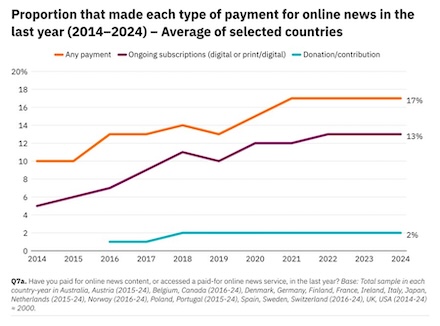 |
||||||||||
|
||||||||||
| At Cannes News Publishers Ponder, “Are We Witnessing the Death of Journalism?” |

Image sourced from Shutterstock
|
| Let's face it: the news industry is not what it once was. With news sites constantly shutting down, we have reached code red for news monetization, and the speakers at Cannes agree. At the Cannes Lions Festival, Wall Street Journal publisher Almar Latour called attention to how advertisers have been avoiding credible news outlets due to concerns over brand safety, exacerbating these outlets' financial struggles. In fact, a Prohaska study revealed that 30% of publishers' ad inventory was unfunded or undersold due to brand safety blocking. Consequently, thousands of journalists have lost their jobs due to economic instability, changing audience preferences, and unpredictable social media algorithms. It comes down to the fact that journalism is expensive. "We've watched so many journalistic outlets around the world, including the United States, just go away at a pace unprecedented over the last year in particular," Jeff Green, CEO and founder of The Trade Desk said at the event. "And that's in part because Facebook has learned it's not advantageous for them to monetize, and they make more in shorts. Real journalism and truth cost money." Yet, Vanessa Otero, CEO of Ad Fontes Media, noted that new research shows ads alongside hard news are still effective, challenging the belief that news is unsafe for brands. Despite the pitfalls, news publishers are not lying down and dying. Some media companies, like Revolt and The Guardian US, just to name a few, are making moves to keep up with the times and diversify their sources of revenue. Of course, as Green warns, things will most likely get worse before they get better, but this is not a death sentence for the industry. It's just some good old-fashioned growing pains as the industry changes. The interconnected fates of tech, brands, and publishers make it essential for advertisers to support journalism for both business and moral reasons. Despite current difficulties, there is optimism that a greater emphasis on truth and objective journalism will prevail. – AB |
|
| The Business Case for Diverse Audiences: NBCU and Group Black's E!+ |
A streaming service understanding the power of diverse audiences? Who knew this day would come? But all jokes aside, it is important to make sure you are curating content that has diverse audiences, not only because it is ethically correct, but because it is good for business. NBCUniversal is partnering with Group Black to launch E!+, a new hub on the Peacock streaming service. Group Black will create and curate original content for E!+. Unlike NBCU's E! cable network, E!+ will feature new original programs and NBCU library content, targeting a diverse audience and attracting advertisers interested in multicultural markets.Cavel Khan, Group Black's chief growth officer, emphasized the crucial role of reaching a multicultural audience for advertisers. The initiative aims to support minority-owned media ventures by attracting advertising revenue traditionally reserved for mainstream outlets. E!+ is part of a broader trend, with other companies like Disney and Fox also focusing on diverse content. The partnership between Group Black and NBCU, which began last year, has already attracted over 30 advertisers and shown significant brand recall improvements. Publishers and advertisers should not underestimate the power of diverse audiences. Unfortunately, diverse audiences are often overlooked, especially in the premium publisher conversations. As Albert Thompson said about the Trade Desk's Top 100 List, "While intended to highlight quality, it misses considerable cultural and contextual factors that define digital consumption today. The Top 100 might have the heavy hitters, but it's missing the soulful, indie corners of the internet where niche communities thrive." Diverse audiences hold immense influence and spending power, so missing out on the audience is bad for business. – AB |
| Kroger Precision Marketing Enhances Meta Ads with Personalized Recommendations |
| Kroger Precision Marketing (KPM) is launching new advertising capabilities on Meta platforms, integrating personalized product recommendations and optimizing online sales performance. Leveraging KPM's retail insights, these Meta ads allow brands to present customized product lists within ad units on Facebook and Instagram, offering a fresh way to engage shoppers. Consumers are increasingly looking for ways to streamline their shopping while saving money. With KPM, Meta ads now bring valuable promotions directly to the communities where people connect. As Cara Pratt, Senior Vice President of Kroger Precision Marketing, said, "Our partnership with Meta enables us to deliver personalized product suggestions and drive conversion campaigns with sales-optimized media." This new feature allows advertisers to access detailed sales metrics, including online purchase data. It includes tailored product catalogs, where ads feature products dynamically chosen from the advertiser's inventory. Additionally, interactive shoppable ads enable consumers to view a curated product selection and directly access the Kroger shopping experience. The ads are optimized for conversions, focusing on driving specific online actions such as adding items to a cart and completing checkouts. Furthermore, advertisers will receive comprehensive sales reporting for promoted products, with offline sales metrics expected to be available later. Pratt added that optimizing media based on retail sales is vital for brand growth, and this collaboration with Meta is a significant step in providing relevant reach, actionable content, and measurable results across the advertising industry. There are plenty of benefits for publishers partnering with retail media networks, but with the space becoming oversaturated, RMNs need to differentiate themselves. KPM is one of the OG's in the space and they even know how important it is to stand out. Is this their move to do so? – AB |
| @{optoutfooterhtml}@ |












